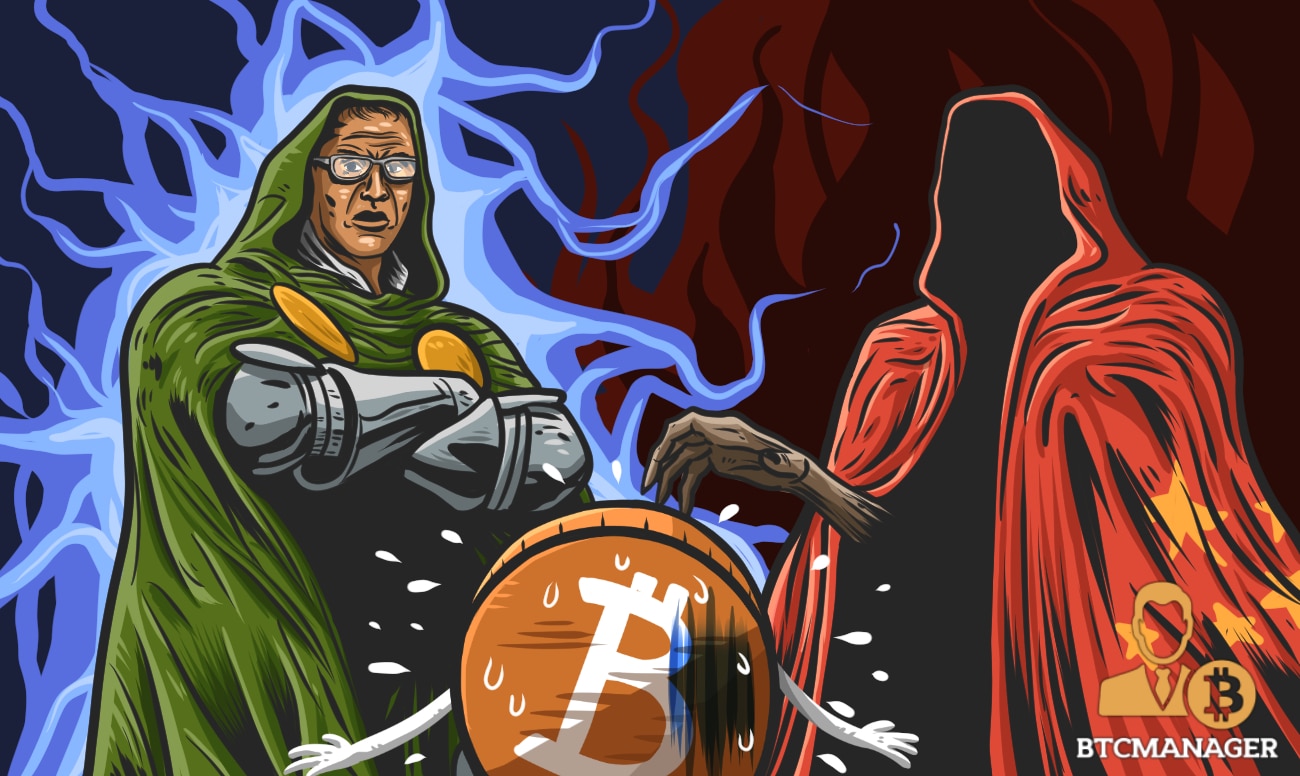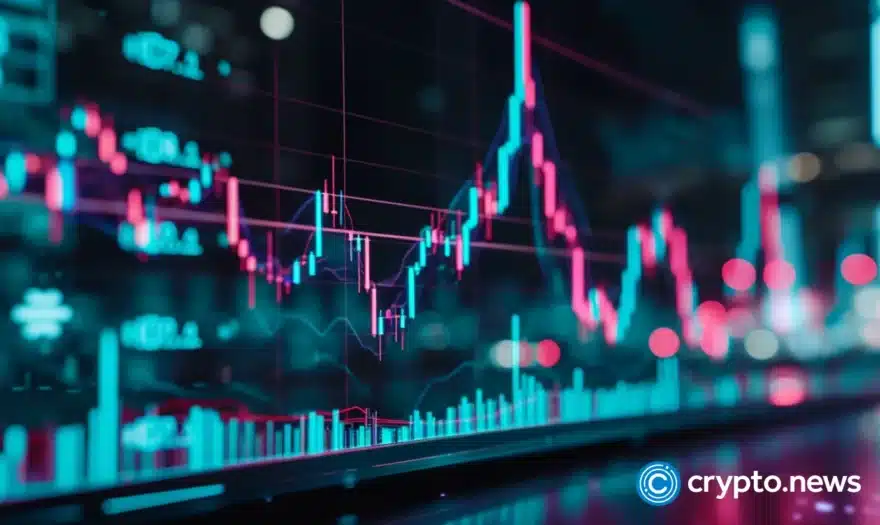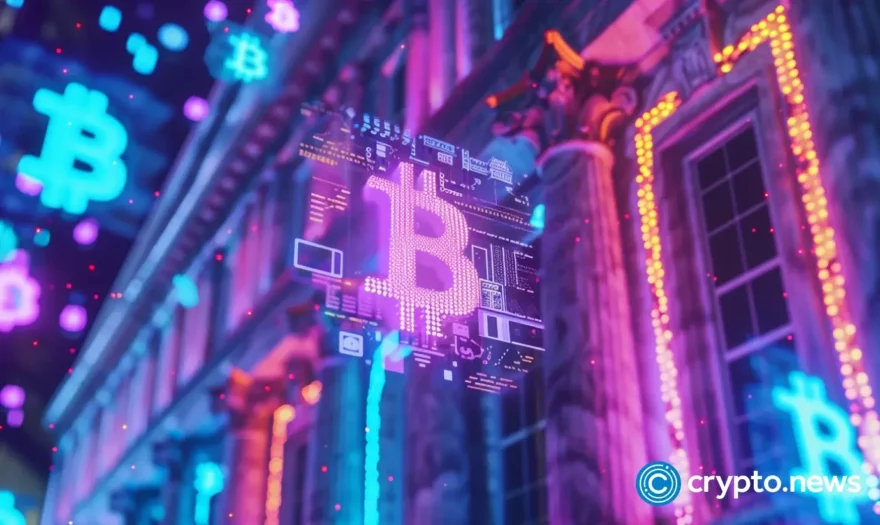Bitcoin Softens as “Dr. Doom” and China Rattle Investors: BTCManager’s Week in Review October 15

The price of bitcoin closed the week on a softer note, dropping by four percent versus last week’s close to around $6,300.
Bitcoin’s correction was caused by “Dr. Doom” Nouriel Roubini’s statement in front of Congress where he called the cryptocurrency sector “the mother or father of all scams and bubbles,” and went on a rant about how valueless digital currencies such as bitcoin are.
Moreover, a new report was released that suggested that the high concentration of miners based in China is a threat to the Bitcoin network as it enables the possibility of an attack being launched on the network.
According to the (non-peer reviewed) paper, 74 percent of hash power is based in the People’s Republic of China and suggests that the country has both the economic means and the motivation to launch an attack on Bitcoin.
While it would not be easy for China to leverage such power, the paper argues that “Bitcoin stands in ideological opposition to China’s centralized governing philosophy,” which could be a reason for China to attempt to destabilize the world’s leading decentralized digital currency.
Unsurprisingly given bitcoin’s price drop, the altcoin market corrected more and is down on average by around ten percent week-on-week. Out of the leading altcoins, only 0x (ZRX) managed to buck the trend, gaining almost 15 percent week-on-week, thanks to the boost it received from its Coinbase listing announcement.
This week’s contributions are provided by Aisshwarya Tiwari, Nigel Dollentas, Ogwu Osaemezu Emmanuel, and Shaurya Malwa.
U.S. SEC Crackdown Blockvest ICO over Irregularities in its Operations
The United States Securities and Exchange Commission (SEC) has taken action against Blockvest LLC., an initial coin offering (ICO) project whose founders falsely claimed to have registered with the commission, whereas they were operating illegally in the state, violating securities regulations, reported Finance Magnates on October 11, 2018.
According to sources close to the matter, the U.S. regulator has hammered Blockvest ICO for violating the authority’s statutes. The agency has said that the organizers of the crypto-based fundraiser deceived investors into believing that the project had the backing of the SEC and other highly-reputed companies.
Blockvest ICO described itself as a new decentralized cryptocurrency exchange and an index fund that tracks the top 30 cryptocurrencies. On its website, the fraudulent scheme clearly states it’s the “First Licensed and Regulated Crypto Currency Exchange &Index Fund based in the U.S.”
The SEC says the founder of the startup, Reginald Buddy Ringgold, also known as Rasool Abdul Rahim El, fabricated claims about Blockvest’s business partnership with a good number of prominent firms including a fake agency called “Blockchain Exchange Commission.”
Bitcoin Developer’s Exchange Could Be the First Within the GCC Region
Talks of Bahraini cryptocurrency exchange Rain expanding into the GCC emerged on October 10, 2018, which would make Bitcoin developer Jimmy Song’s exchange the first in the region.
The GCC, also known as the Gulf Cooperation Council, is a region within the middle east that includes all Arab States of the Persian Gulf except Iraq. Qatar, Saudi Arabia, and the United Arab Emirates all are part of this region, making it a concentrated section of wealth.
Rain’s possible insertion in this area would have two main purposes: Allowing cryptocurrency to enter a new market as well as help assuage concerns that have risen due to increasing regulation.
Blockstream Launches the Liquid Network, Bitcoin’s First Sidechain
Blockstream has announced the launch of the Liquid Network, the world’s first production Bitcoin sidechain. The bitcoin startup revealed that the network went live on September 27, 2018. The announcement was made by Blockstream’s Chief Strategy Officer Samson Mow.
The liquid network is a federated sidechain which allows for a one to one exchange of bitcoin without any interchange settlement lag. The sidechain is explicitly designed to operate in the context of trading platforms and exchanges. Blockstream explains:
“The Liquid Network was built specifically to address the particular needs of exchanges and enables the rapid, confidential and secure transfer of funds between participants, providing a solution to the inherent problem of delayed transaction finality on the Bitcoin network.”
The Liquid Network is a secondary layer on top of the main Bitcoin blockchain. It keeps a real-time record of the Bitcoin blockchain for security but supports extended functionality for the transactions that are processed through its network. The Liquid Network has its native cryptographic token, called L-BTC, which is pegged to bitcoin. BTC frozen in the main chain backs L-BTC.
South Korea Mulls Over Reversing Ban on ICOs
South Korean legislators are planning to chase the road to clear their stance on Initial Coin Offerings (ICO) in November this year. Despite the government’s on-again-off-again relationship with cryptocurrencies, a National Assembly committee has mooted to revamp the cryptocurrency policies in the country on October 10, 2018.
Dope chart from @OpimasLLC showing the shifting regulatory landscape in crypto
South Korea has had the most interesting journey it appears pic.twitter.com/xNNFvD7MRQ
— Frank Chaparro (@fintechfrank) October 16, 2018
South Korea has been looked upon as the harbinger of positive change in the cryptocurrency market by re-legalizing initial coin offerings (ICOs). The Korean government was antithetical towards ICOs, until the recent past. However, now some changes are being seen.
When asked about the government’s stance on ICOs, chief of the Office for Government Policy Coordination, Hong Nam-Ki said: “We have had several discussions (on ICOs). Once the survey results are in by end-October, we plan to finalize the government’s stance.” Hong added:
“We surveyed as some companies are conducting or preparing for ICOs despite the ban here.”
E.U. Securities Watchdog Studying ICOs “Case-by-case” to Take a Call on Regulation
The European Union’s securities watchdog has followed suit of its U.S. counterpart SEC, as the European Securities and Markets Authority (ESMA) said on October 8, 2018, that it is observing every initial coin offering (ICO) to decide whether it should be regulated or not, according to a report published by Reuters.
Steven Maijoor, chairman of the ESMA, stated he was examining how ICOs fit into existing regulation and their impact on the broader capital raising sector. National regulators in the E.U. and ESMA are jointly investigating which ICOs come under existing securities rule on “case-by-case” basis.
Maijoor went on to compare ICOs to financial instruments. Addressing the European Parliament’s economic affairs committee, he said:
“Some of these ICOs are like a financial instrument. Once it is a financial instrument it comes under a whole regulatory framework. The subsequent question is what do we do with those ICOs that are outside the regulatory world. We will assess that as a board. We expect to report by the end of the year.”
Report: Bitcoin Whales not Responsible for Destabilizing Cryptocurrency Markets
Contrary to the popular belief which posits that “crypto whales” are the prime culprits for digital currency market volatility – a new study published on October 10, 2018, by blockchain research firm Chainalysis suggests that cryptocurrency’s largest holders are a diverse set of individuals that help in stabilizing the nascent market.
A couple of months back, in August, rumors made rounds in the cryptosphere about a massive $2 billion crypto whale, which was reckoned to be responsible for the fall in Bitcoin’s (BTC) value by more than 15 percent after selling more than 50,000 coins in a month. This speculation was substantiated in a report by Bloomberg.
This centralization of power in the hands of the big players in the crypto industry is a major cause of worry among the retail and long-term investors, and rightly so. However, the study by Chainalysis shows these fears to be blown out of proportion. In proper crypto ethos – one might even call it “FUD.”
An analysis of the 32 biggest bitcoin wallets concluded that the so-called bitcoin whales are a diverse group, with only a third of them being active traders. And although theoretically, these whales do have the capability to move the markets as per their wish, in reality, they have generally traded against the herd by purchasing digital currencies on price declines.
FSB Releases Bullish Report on Cryptocurrencies
The Financial Stability Board (FSB), the international body that monitors the global financial system, published a report on October 10, 2018, titled “Crypto-asset markets: Potential channels for future financial stability implications.”
The report chiefly touched upon the initial assessment put forward in March 2018 by Mark Carney, FSB Chairman and Governor of Bank of England. The letter from Carney was addressed to G20 finance ministers and central bank governors, stating that the risks associated with the crypto market do not pose a threat to the overall global financial sector.
It stated in no uncertain terms that “crypto-assets do not pose a material risk to global financial stability at this time.” The report also highlighted on risks in the crypto space such as market dangers caused due to volatility, low liquidity, and use of leverage. However, that does not mean that it does not require constant vigilance and monitoring, the report noted. It further added, that if cryptocurrencies’ use were to evolve in future, that could have severe consequences for financial stability in the future.











